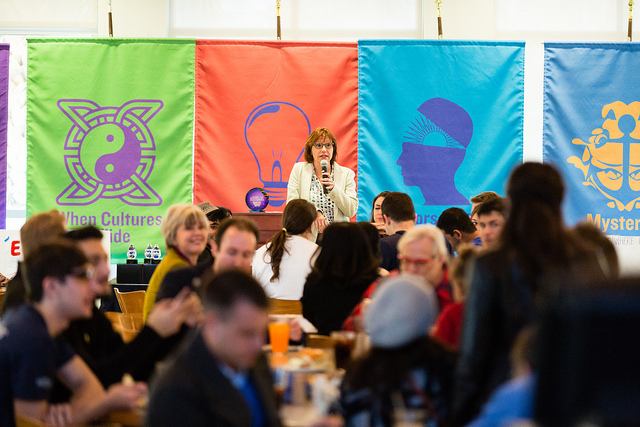On Nov. 1, Dean of General Education Dr. Emily Russell, along with several faculty members and students, held an open forum to discuss possible improvements to Rollins’ general education system, rFLA. This panel’s purpose was to address student concerns regarding rFLA.
The panel addressed what changes would be made to the rFLA 2.0 system. First, Rollins faculty aims to provide a more cohesive learning opportunity. Courses will demonstrate a relevance toward each other, and the capstone will allow students to reflect on what they learned and connect it to the real world.
Second, a two-credit career development course may be added to the competencies. This will most likely include resume building skills. Adding more ‘adulting skills’ to the Health and Wellness curriculum, such as financial lessons, was also deemed possible.
The rFLA system is Rollins’ designated path for students to fulfill the general education requirements that compliment a liberal arts education. It stands for Rollins Foundation in the Liberal Arts, and includes 10 classes such as a freshman course (RCC), four classes fulfilling competencies (math, writing, foreign language, and health and wellness) and five fulfilling the “neighborhood system” (expressive arts, natural science, social science, and humanities).
The neighborhood system was launched in 2014 and is named after Mr. Rogers’ “Neighborhood,” a television program starring Fred Rodgers who is one of Rollins’ most respected alumni. However, as a relatively new system, it has been causing some confusion among students.
One of the major student concerns brought up during the panel was advising. When students reach out to faculty members for advice, they do not always know the course sequence or what is required of students. However, faculty members are continuing to receive training regarding this curriculum, and, as time goes on, advising will be improved. There will also be a more robust demonstration of students’ rFLA curriculum in Degreeworks.
Furthermore, students expressed frustration that they are required to take courses outside of their major and that some of these courses are harder than their major courses. This was addressed by reminding students that the purpose of these courses is to force students to think out of the box, and that the purpose of the liberal arts curriculum is to expose students to real-world issues surrounding the community.
Faculty expressed the concern that students do not understand the value of the liberal arts education provided by Rollins. Faculty are working towards discussing this in individual emails and other methods of communication.
Yet, faculty also expressed that there will be efforts made to improve the consistency of course material and consistency in science courses offering a lab. In addition to that, it was explained that each major has a different level of difficulty and it is impossible to require that rFLA courses be more or less rigorous in order to match the standards of the student’s individual major.
RFLA faculty want students to realize that this system is in its developing stages, and, through trial and error, the system will be perfected. Through rFLA, faculty want students to gain an understanding of the purpose of their liberal arts education and become exposed to a broad array of learning experiences, which one may not initially choose to explore.







Be First to Comment